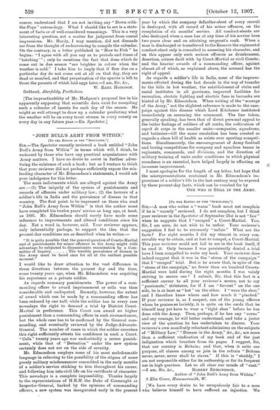" JOHN BULL'S ARMY FROM WITHIN."
[TO THE EDITOR OF TUE "SPECTATOR.".1 SIR,—The Spectator recently reviewed a book entitled " John Bull's Army from Within" in terms which will, I think, be endorsed by those who have any practical acquaintance with Army matters. I have no desire to assist in further adver- tising the existence of such a book ; but as I venture to think that your reviewer did not perhaps sufficiently expose the mis- leading character of Mr. Edmondson's statements, I would ask
your indulgence for this letter.
The main indictments which are alleged against the Army are :—(1) The iniquity of the system of punishments and records of offences under military law ; (2) the horrors of a soldier's life in India and the prevalence of disease in that country. The first point to be impressed on those who read "John Bull's Army from Within" is that the author must have completed his twelve years' service as long ago, at least, as 1895. Mr. Edmondson should surely have made some reference to improvements and altered conditions since his day. Not a word is, however, said. Your reviewer appears, only inferentially perhaps, to support the idea that the present-day conditions are as described when he writes :—
" It is quite possible that the general question of Courts-Martial and of punishments for minor offences in the Army might with advantage be subjected to dispassionate examination by a Com-
mittee of Inquiry The terrible prevalence of disease in the Army must be faced once for all at the earliest possible moment."
I would like to draw attention to the vast difference in
these directions between the present day and the time, some twenty years ago, when Mr. Edmondson was acquiring his experience as a private soldier.
As regards summary punishments. The power of a com- manding officer to award imprisonment or cells was then considerable and undisputed. Recently, however, the extent of award which can be made by a commanding officer has keen reduced by one half, while the soldier has in every case nowadays the right to demand a trial by District Court- Martial in preference. This Court can award no higher punishment than a commanding officer in such circumstances, but the whole case has to be confirmed by the General com- manding, and eventually reviewed by the Judge-Advocate- General. The number of cases in which the soldier exercises this right sufficiently attests his confidence in such a Court. " Cells " twenty years ago was undoubtedly a severe punish- ment, while that of "Detention" under the new system certainly does not err on the side of severity.
Mr. Edmondson employs some of his most melodramatic language in referring to the possibility of the stigma of some purely military misdemeanour committed in the early months of a soldier's service sticking to him throughout his career, and following him into civil life on his certificate of character. This nowadays is a complete impossibility. Thanks largely to the representations of H.R.H. the Duke of Connaught as Inspector-General, backed by the opinions of commanding officers, a new system was inaugurated early in the present
year by which the company defaulter-sheet of every recruit is destroyed, with all record of his minor offences, on the completion of six months' service. All conduct-sheets are also destroyed when a man has at any time of his service been two years clear and on attaining sergeant's rank. When .a man is discharged or transferred to the Reserve the regimental conduct-sheet only is consulted in assessing his character, and on this appear only such serious offences as drunkenness, desertion, crimes dealt with by Court-Martial or civil Courts; and the heavier awards of a commanding officer, against almost all of which, as explained above, the accused has the right of appeal.
As regards a soldier's life in India, none of the improve- ments effected during the last decade in the way of transfer to the hills in hot weather, the establishment of clubs and social institutes in all garrisons, improved facilities for recreation, electric lighting and electric fans in barracks are hinted at by Mr. Edmondson. When writing of the "scourge of the Army," not the slightest reference is made to the cam- paign against this disease which Lord Kitchener instituted immediately on assuming the command. The line taken, generally speaking, has been that of direct personal appeal to the better feelings of soldiers of all ranks, the cultivation of esprit de corps in the smaller units—companies, squadrons, and batteries—till the same emulation has been created as regards a clean bill of health as exists over sporting competi- tions. Simultaneously, the encouragement of Army football and boxing competitions for company and squadron teams in regiments, commands, and divisions, and the direction of military training of units under conditions in which physical soundness is an essential, have helped largely in effecting an immense improvement.
I must apologise for the length of my letter, but hope that the misrepresentations contained in Mr. Edmondson's im- pressions of a soldier's life in the last century may be exposed by these present-day facts, which can be vouched for by
ONE WHO IS STILL IN THE ARMY.










































 Previous page
Previous page